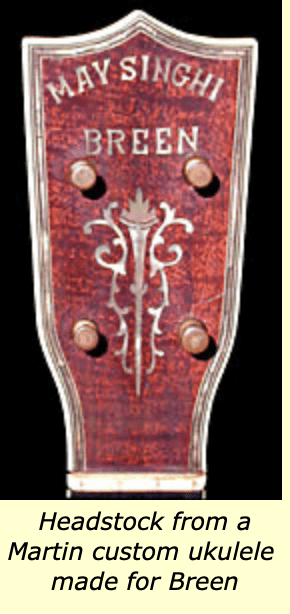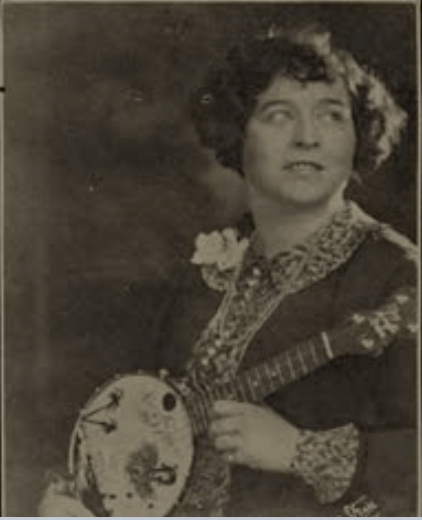May Sinchi Breen was called “The Ukulele Lady,” and even “The Goddess of Uke,” but her love of the instrument was not instant. When she was 30 years old Breen received a ukulele as a Christmas present, but she took it back to the department store to exchange it for a bathrobe. The store would not make the exchange, so she decided she might as well learn to play the instrument. This was a blessing to both the entertainment world and to the ukulele, whose reputation improved because of her efforts.
Breen became adept with the ukulele and, at the beginning of the roaring 20’s, performed in an all-women musical group that played on the radio in the New York area. Then she met songwriter Peter DeRose in 1923, whom she would later marry. DeRose was a pianist and composer who wrote songs for Broadway, John Coltrane, Spike Jones, and Peggy Lee. His most famous song perhaps is “Deep Purple,” written in 1934.
DeRose, on piano, and Breen, on ukulele, created a radio show called Sweethearts of the Air. The show almost didn’t receive an airing because the American Federation of Musicians union would not recognize the ukulele as a classical instrument, thus denying her an opportunity to plan in a unionized environment. Breen’s conviction and arguments that the instrument was equal to others won the day and the radio show ran for 16 years.

In another effort to promote the legitimacy of the ukulele, Breen persuaded publishers of sheet music to include ukulele chords in all popular music. As a result, the Irving Berlin Corporation hired Breen to make those annotations in their publications. According to the Ukulele Hall of Fame, “Her own arrangements appear on more pieces of sheet music than those of any other single person in history.”
Breen was seriously devoted to the ukulele (which, by the way, is not pronounced with an opening “you” but with an opening “oo”). She played the traditional Hawaiian music, but she also played jazz, blues, and rock. She was a teacher of the instrument, the first to teach ukulele in schools. She also recorded a “Ukulele Lesson” on a 78 rpm record, the first to do so. And she appeared on television. In recognition of her battle to give legitimacy to the ukulele, she became a member of the American Society of Composers, Authors, and Publishers
During World War II, Breen used her experience at championing causes to fulfill her patriotic duties. She headed training and operations for the New York Air Warden Service, and also served as national director of air raid precautions for the American Women’s Voluntary Services.
When Breen died, the New York Times published a biography with the heading “May Sinchi Breen, Ukulele Lady of Radio in 20’s and 30’s. In the first sentence the paper mentioned her husband, but the balance of the article was about her achievements. Another obituary ran with the headline, “Mrs. Peter DeRose, Widow of Songwriter.” This was a double insult as May Sinchi Breen was not defined by her husband and had not used her husband’s name. It was after all 1970, when women were defined by their husbands, but still the insult stands.
The Ukulele Hall of Fame was founded in 1996, and in 2000 May Sinchi Breen was inducted. She was the First Woman and, to date, the only woman inductee.
____________
When I am asked where I find my First Women, my usual answer is that they more often find me. I was watching “Antiques Roadshow” and a woman showed the appraiser a case with two ukuleles, one with May Sinchi Breen’s name on it. The appraiser said Breen was the First Women inducted into the Ukulele Hall of Fame. Voila! I had to know more

